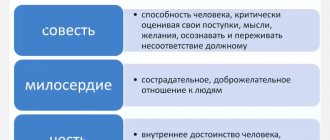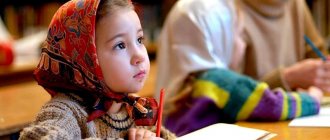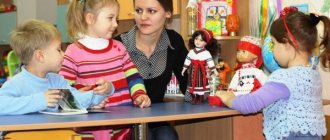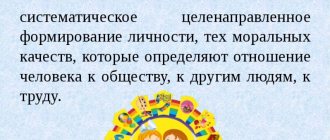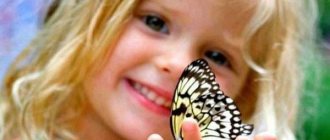Pedagogical project “Spiritual and moral education of children based on the traditions of their people”
Administration of the Saransk urban district
Department of Education
MDOU "Kindergarten No. 78 combined type"
Pedagogical project
“Spiritual and moral education of children based on the traditions of their people”
(for the 2017-2018 academic year)
Performed:
teacher of the first quarter category
Malaeva Olga Borisovna
Saransk 2017
Problem
The rejection of the younger generation from national culture, from the socio-historical experience of generations is one of the serious problems of our time. It is necessary to develop children's understanding of cultural heritage and cultivate a caring attitude towards it from preschool age.
“No one can become the son of his people if he is not imbued with those basic feelings with which the people’s soul lives. No matter how complex or dark the psychology of the national bond may be, we can, however, assert that we cannot mature outside of the national culture, which we must imbue so that the powers inherent in the soul of our soul can be developed.”
, —
wrote the famous Russian religious philosopher
.
The system of spiritual and moral education of a child is built “on” and “through” introducing him to the cultural heritage of his people. An important means of spiritual and moral education of preschool children is to introduce them to the traditions of the people.
Relevance
The topic is determined by the need of our society for the spiritual and moral education of children based on the traditions and culture of the Russian people and the peoples inhabiting Russia.
In the Education Law, spiritual and moral education is designated as one of the priority areas for the overall development of the child.
Childhood is the time when a person acquires knowledge about the world around him, the time of formation of moral skills and habits. In preschool age, there is an active accumulation of moral experience, and turning to spiritual life also begins in preschool age with moral self-determination and the formation of self-awareness. Systematic spiritual and moral education of a child from the first years of life ensures his adequate social development and harmonious personality formation.
“Education, if it does not want to be powerless, must be popular!” said K.D. Ushinsky. He introduced the term “folk pedagogy” into Russian pedagogical culture, seeing in folklore works the national identity of the people, rich material for instilling love for the Motherland.
It is probably best to introduce preschool children to folk culture through folk holidays and song and play traditions. Holidays are a special, bright, living side of folk culture, reflecting ancient traditions, rituals, and the historical experience of the people. National holidays fill a child’s life with the light of kindness and affection, enrich him spiritually, and lay the foundations of high human values. Revealing a child's personality is entirely possible through his inclusion in the culture of his own people. And this is not just knowledge about culture, but living in culture, living in tradition, through entering the annual holiday circle. Children get acquainted with folk traditions, and then bring the acquired knowledge and experience into their daily activities. The wisdom of folk culture makes them more knowledgeable in everyday situations, educates them emotionally and morally, and prepares them for the future life.
Project “Morality Week in Kindergarten”
Author:
Sadubova Samal Ibraimovna,
educational psychologist
MADO D/S No. 186 of the city of Tyumen
Education is designed to influence the morality of society,
elevate the spirit above the body,
bring forward spiritual needs.
The task of education is to awaken attention to spiritual life...
If our student knows a lot, but is interested in empty interests,
if he behaves perfectly, but his alert attention is not awakened
to the moral and beautiful - you have not achieved the goal of education. K. D. Ushinsky
Project type: family, short-term.
Project participants : Educational psychologist, parents, preschool teachers, children of middle, senior and preparatory groups,
Project implementation: April, May 2015
Objective of the project:
Increasing the role of family values in the development of a child’s personality and his moral education.
Project objectives:
• Create conditions for effective interaction between kindergarten and family to familiarize preschoolers with the world of moral values of family traditions.
• Provide parents with theoretical knowledge and practical skills
positive interaction with children in various activities.
• Arouse interest among children and parents in the family and its history.
• Show children the importance of family in the life of every person. To instill in children love and respect for their parental home, family, their loved ones, and the older generation.
Features of the project:
• reliance on the personal experience of children gained in the family
• availability of material for preschool children
• maximum involvement of parents and provision of practical assistance to them in familiarizing children with family values and family history
• integration of joint activities of children and parents at home with their activities in a preschool educational institution
Statement of the problem : From birth, a child is a discoverer, an explorer of this or that world that surrounds him, especially the world of his family. Formation of love and respect for parents in children; give the child the opportunity to actually independently touch family values, traditions, and principles of life; find unexpected discoveries by learning about the lives of grandparents.
Problems that the project aims to solve
Raising a child is a very multifaceted process. It unites all areas of our lives, whether we like it or not. Everything that surrounds children, one way or another, influences the formation of personality. But the family has the greatest strength and power. Parents are the first whom the child meets, the first who surround him and take care of him, the first who significantly influence him. And even no matter how much time you spend with your child, it will primarily copy the behavior of its parents.
• Disintegration of continuity of generations, disappearance of family traditions.
• The extremely low level of moral culture of the majority of modern parents as insufficient competence of the family in matters of moral formation and education of the child’s personality.
• Loss of the family function of transmitting significant cultural and life values to children.
• Lack of knowledge among preschoolers about their family and its history.
• Distorted ideas about the meaning of human life and true values among the younger generation of raising adults.
• Disconnection between family and kindergarten.
The family is the first social institution that a child encounters in life and is a part of. The family occupies a central place in the upbringing of a child, plays a major role in shaping the worldview, moral standards of behavior, feelings, social and moral appearance and position of the child. In a family, raising children should be based on love, experience, traditions, and personal example from the childhood of relatives and friends. And no matter what aspect of a child’s development we consider, it will always turn out that the family plays the main role in the formation of his personality at different age stages.
Project implementation
At organized meetings with parents, we try to explain to them how important their personal example, joint activities, and heart-to-heart conversations are for conveying moral and moral ideas to children. Throughout the school year, consultations were held for parents on the topics “The influence of parental attitudes on child development”, “Computer and TV - pros and cons”, “Bad habits in childhood”, Rewards and punishments - a reasonable balance”, “How to tell fairy tales to children” . The events “Kindergarten - you and me, a friendly family”, “Morals of my family”, and the “Tree of Wishes” and “Rainbow of Mood” events were held.
The lessons and conversations from the “My Family” series are valuable in their content.
The group regularly conducts classes on the topic “Lessons of Goodness,” during which they talk about moral and ethical values, mercy and respect for elders.
The trainings “Kindergarten, you and I are a friendly family”, “Moral values of my family” had a significant impact. The main goal of such projects is to strengthen the family, family values, traditions, cultivate moral qualities in children, involve children and adults in the creative process; communication between parents and children.
Fostering a caring attitude towards nature is an important part in the moral development of a child’s personality.
Thematic consultations, reminders, and booklets for parents have been developed.
Love for animals is a good, cheerful feeling, the basis of many
the most important moral qualities: compassion, desire to show care, attitude towards the weak. To this end, a series of conversations and classes were held.
According to parents, preserving family values, respect for them, and reviving traditions have a beneficial effect on positive relationships in the family. Children develop a sense of responsibility, mutual care, help, respect towards their family and friends
Consequences of solving the problem
The competence of parents in matters of family education increases. The continuity of family generations is being restored. Children will receive the necessary information about their family, its history, traditions and customs.
There is an exchange of experiences of family upbringing and traditions. Search for new forms of interaction between teachers and parents.
Expected Results
We believe that the main result, which our work is aimed at, is the child’s assimilation of eternal values: mercy, compassion, love for family and friends, in his desire for good and rejection of evil.
Event plan
| Day | Work with children | Working with parents |
| — ECD with children of senior groups “Our emotions and feelings” — Promotion “Rainbow of Mood” | |
| — GCD in junior groups “The ABC of Emotions” — Game “I want to be friends with you” | Training “Kindergarten, you and I are a friendly family!” |
| -NOD with senior groups “What is kindness” | Promotion “Tree of Good Wishes” |
| Games “Tender name”, “Compliment” NOD "Travel to Kazakhstan" | |
| Exhibition of creative works “My Happy Family” Conversation in senior and middle groups “My Family” | Training for parents “Family Values” |
The following events were carried out within the framework of the project:
1. Day of Smile. On this day, an action was held in senior groups “Rainbow of Mood”. The children chose their mood in the morning and evening by color, and then we played games with them aimed at developing empathy, the ability to feel and understand themselves and others.
2. Friendship Day. This day was especially memorable for the parents. Parents of older groups were invited to the event “Kindergarten, you and I are a friendly family.” The games were aimed at uniting the parent group of the group, for example, “Caterpillar”, Web of Compliments, come up with a group motto; to improve parent-child relationships, for example, “On the Bridge”, “Family Daisy”; as well as on parents’ awareness of the difficulties of educational work. Many parents, having been in the role of educators, said that we would never become educators, how difficult it is.
3. Kindness Day. This day was remembered for the “tree of good wishes” campaign. All parents and children were invited to participate in the campaign and write a good wish to the kindergarten staff on leaves and attach the leaf to a birch tree. There were many wishes, all of them were read out to the employees. They wished them health, success, happiness, patience, good and obedient children, prosperity, and to always be greeted with a smile.
4. A lesson was held with the children on the topic “what is kindness”, they remembered their good deeds, deeds and attached a leaf to a tree.
5. Day of Tolerance. On this day it was said that we live as one family, that we are friends among peoples and each nation has its own interesting traditions. So, we decided to introduce the children to one of the numerous nationalities in the Tyumen region - the Kazakhs. Parents and children went on a trip to Kazakhstan. Parents and children remembered making camels out of colored salt in glass vessels, as well as drinking tea in a Kazakh yurt, prepared by the group teacher.
6. Family Day. This day was dedicated to family, family values and traditions. An exhibition of children's works “my family” was organized and parents and children of the middle group were invited to the event “my family values”. In one of the tasks, I asked parents and children to jointly draw the coat of arms of their family. It is diagnostic to observe how parents interact with their children, who is in charge, how responsibilities are divided, and what the drawing turns out to be. For some it was a nest with birds and chicks, a house and the whole family, while for others it was one child and no one else. Parents expressed that they had never thought about what kind of coat of arms they might have, and how difficult it is to come up with and put meaning into a drawing.
Result: I believe that we were able to create conditions for effective interaction between kindergarten and family to familiarize preschoolers with the world of moral values of family traditions. They aroused interest among children and parents in the family and its history. We managed to show children the importance of family in the life of every person and brought parents and their children closer together.
Bibliography
|
We invite teachers of preschool education in the Tyumen region, Yamal-Nenets Autonomous Okrug and Khanty-Mansi Autonomous Okrug-Yugra to publish their teaching materials: - Pedagogical experience, original programs, teaching aids, presentations for classes, electronic games; — Personally developed notes and scenarios of educational activities, projects, master classes (including videos), forms of work with families and teachers.
Why is it profitable to publish with us?
1. “Kindergartens of the Tyumen Region” is an officially registered specialized media outlet at the federal level. 2. The activities of the editorial office are supported by the Department of Education and Science of the Tyumen Region 3. We issue a “Certificate of Publication” in the media. 4. The document has a unique number, is entered in the register, has the original seal of the editorial office of the online publication and signature. 5. “Certificate of publication” in the media is sent to the author in both paper and electronic versions.
Details >>>
Sample “Certificate of publication of author’s methodological material in the media.”pdf
Share
